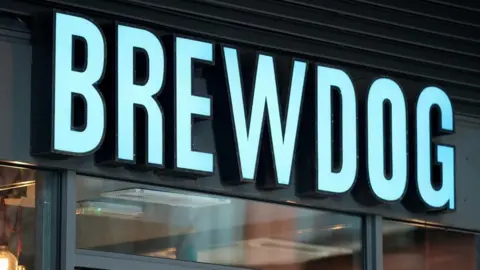Brewdog, the prominent Scottish craft beer company, has announced a troubling development in its operations, revealing plans to close down ten of its pubs across the United Kingdom. This includes the flagship bar located in Aberdeen, a significant site that has played a crucial part in their brand identity. This decision has raised eyebrows particularly due to the assertion from the trade union Unite, which indicated that some of these locations could cease operations “within days.”
The establishments that are slated for closure are spread across various cities, including Aberdeen—where the company began its journey—Dundee, Brighton, Oxford, Leeds, Sheffield, York, and three venues in London. Brewdog was co-founded in 2007 by fishermen James Watt and Martin Dickie in Fraserburgh, Aberdeenshire. Since its inception, the brewery has embraced a strong, rebellious identity and has become synonymous with craft beer in the UK and beyond.
A spokesperson for Brewdog described the closure decision as a “difficult” one, driven by a multitude of relentless challenges the industry currently faces. These challenges include rising operational costs, increased government regulations, and wider economic pressures that have impacted the ability to keep these bars financially viable. The spokesperson elaborated that, despite thorough efforts from their team, ensuring the success of these bars was not feasible. This closure is perceived not merely as a reaction to a struggling hospitality market but as a proactive strategy to pivot the bar division toward sustainable growth in the long run.
Interestingly, while some of these venues hold a nostalgic significance to Brewdog, the spokesperson underlined that the reality of the business landscape left them with “no realistic prospect” of making these ventures profitable. This sentiment highlights the harsh reality faced by many in the hospitality industry, where not all beloved venues can withstand severe economic currents.
The announcement prompted a sharp response from Bryan Simpson, Unite’s national lead for hospitality, who condemned the company’s decision to inform its staff of closures with minimal notice—reportedly less than four days. Simpson’s remarks underscored a deeper issue regarding corporate responsibility and employee welfare, suggesting that this approach might not only breach ethical standards but could potentially contravene employment laws. In solidarity with affected staff, Unite pledged to support their members in legally contesting the redundancies and aimed to provide the necessary resources to navigate this difficult transition.
Brewdog maintained that a 14-day consultation period would be initiated for staff members facing redundancy. However, the company declined to disclose the precise number of employees affected, stating instead their commitment to redeployment efforts within the organization. Known for its adventurous beers and ambitious marketing campaigns, Brewdog operates not only across the UK, with 71 venues, including 17 in Scotland, but also has bars in international markets including Dubai, the USA, and Australia.
The firm has recently been under scrutiny not only for its closures but also regarding its internal practices and corporate culture. In past years, Brewdog has faced significant backlash over allegations related to workplace culture. A 2021 open letter from former employees cited a “culture of fear,” and in 2022, allegations of inappropriate behavior surfaced against co-founder James Watt, leading to public criticism and discussions on company behavior in the media.
Throughout these changes and challenges, Brewdog has expanded into new markets, including a 2023 venture into China alongside Budweiser, a collaboration reflecting broader ambitions. The company reported a significant revenue growth to £321.2 million in the fiscal year 2022-23, albeit it struggled with profitability in preceding years. There exists a dichotomy with Brewdog that juxtaposes its innovative and market-disrupting image against the challenges it faces in maintaining both its community ethos and operational stability.
In light of the closures, Brewdog’s resilience and strategic redirection will be crucial as the landscape of craft brewing continues to evolve along with economic and social changes. The full list of Brewdog pubs to be closed includes locations in cities integral to the brand’s history, raising questions about the future of these establishments and the employees who depend on them.
In conclusion, while Brewdog has established itself as a formidable force in the beer industry, the path forward is layered with complex challenges that will demand innovative solutions and a commitment to community and staff welfare.










